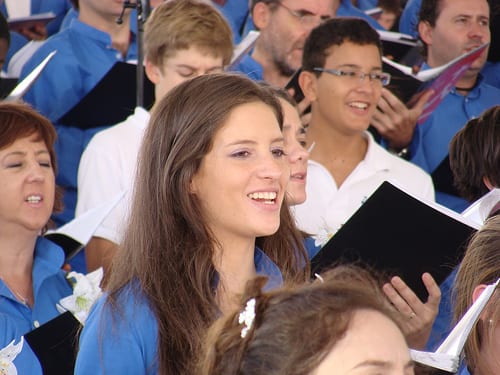 Descartes once said, “I’m tone deaf, therefore I’m hopeless.”
Descartes once said, “I’m tone deaf, therefore I’m hopeless.”
Wait, no, that’s not right. But the debate is certainly real: Is there such a thing as being “tone deaf”? And if so, should the hopeless few bother with singing lessons if their dream is to one day perform on stage?
Much like mastering any other skill, learning to sing comes with many common misconceptions from outsiders. So read on – we’re about to debunk them!
1. Singing lessons are for people who can’t sing.
Think again! While professional training can definitely help students who don’t have the “natural” talent people often refer to, you may find that you’ll see even more benefits if you already have a decent foundation. For one, a voice teacher will be able to hear (and see) things that you may not while you’re focusing on your breathing or another aspect of your performance. The guidance you’ll receive can be incredibly valuable. Moreover, a great singing teacher can help you keep your focus and set realistic goals, and may even be able to open doors for you through networking, audition opportunities and more.
2. I can learn enough by watching YouTube videos about singing.
Not so fast. YouTube definitely has some great tutorials, but similar to misconception #1, working with a professional will do wonders for your technique. Still learning proper breathing? Your teacher can point out where to place your hand to feel your breath. Preparing for an audition? A teacher can help you build your stage confidence. Without the individual feedback from a private teacher, students may end up with bad habits, or practice the same thing over and over with little progress.
3. I can’t sing that song, because my range doesn’t go that low/high.
While you certainly don’t want to strain your voice, the beauty of private singing lessons is that you can work with your teacher to extend your vocal range and prepare yourself to sing even more songs than before. You’ll notice a difference with even simple changes, such as engaging in effective vocal warm-ups and recognizing your chest voice versus your head voice.
4.I’m tone deaf – there’s no hope for me.
Tone deafness (also called “amusia”) describes a person’s inability to recognize relative pitches in music, and is the ultimate fear of many karaoke singers all across the world. But can it be corrected?
Fortunately for you, vocal lessons can definitely help. Singing off-key often has more to do with poor vocal habits, which can be corrected with private lessons. For example, beginners might try to force a high note, which inevitably leads to falling out of key. Sometimes it even stems from something deeper, like feeling self-conscious about your tone. With proper training, even the most cynical of singers can begin to recognize notes and pitches. The more exposure you have, the easier it will become.
Photo by ruifernandes.
Suzy S.
